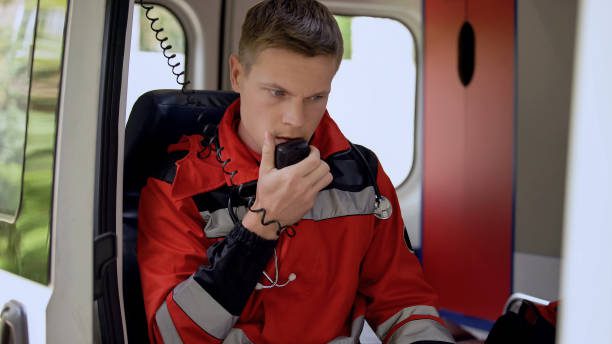
| Emergency Dispatcher Key Stats | |
|---|---|
| Education | 0-1 Year |
| Job Outlook | 6% |
An emergency dispatcher receives calls to emergency phone lines, such as 911, from people in a crisis, and then dispatches emergency services such as police, firefighters, and ambulances to the scene.
If you’re calm in a crisis, a good communicator, and have a strong attention to detail then you might like to become an emergency dispatcher.
When you become an emergency dispatcher, your job is a challenging one.
You’ll need to be able to communicate with people who are often under very stressful situations or may be unintelligible.
You’ll also need to be able to think on your feet, and solve problems as they arise.
Emergency dispatchers are sometimes known as public safety dispatchers or 911 operators.
Table of Contents
Education Requirements to Become an Emergency Dispatcher
The requirements to become an emergency dispatcher are different in every state.
In most places the educational requirement is a high school diploma or a GED.
The hiring procedure is quite stringent, and you will need to pass a range of tests before you can gain a role as an emergency dispatcher.
A good place to start is by finding out what the process is in your own state.
You can find some information on state-specific requirements at the Association of Public Safety Officials website.
To begin with, you’ll need to submit a job application for the role.
Applicants are screened, both via their application and through an interview process.
If you are successful during the interview process, you will need to pass medical and psychological screening.
In some states you are required to take a polygraph test also.
A criminal check will be done, if you have any felony charges you will not be employed as an emergency dispatcher.
Once you become an emergency dispatcher you will start on the job training, and this takes between three and six months to complete.
Emergency Dispatcher Job Description
When you become an emergency dispatcher, your role will be to take phone calls from an emergency line such as 911.
You will communicate with the caller, and take down details of their situation and emergency.
If appropriate, you will contact emergency personnel such as ambulance, police or fire fighters to respond.
Often an emergency dispatcher provides assistance to a caller over the phone.
This assistance could be simply helping the caller to calm down.
It might be first aid advice, or other information which can help the caller.
Often an emergency dispatcher has to judge the urgency of a call.
For instance, someone may call 911 because they have spotted a snake in a park.
This call would be redirected to pest control in the area, while other situations may be a fire or a traffic accident where the police or fire stations will be alerted.
Record keeping is also important in this role, data entry is essential for all calls.
Some calls are later used in court, or even on reality TV shows.
This can be a stressful job.
It’s important that you be able to leave your work at work, and not take the stress of the role home at the end of the day.
This role has a high turnover, as many people find the work difficult after some time.
An emergency dispatcher often works varied shifts, and you could be working at night, or the weekends or on holidays.
Emergency Dispatcher Salary and Career Path
When you become an emergency dispatcher, you will work in an office.
Most work forty hours a week, but quite a lot of emergency dispatchers work part-time also.
The average salary of an emergency dispatcher is $33,000 a year.
With experience, you could go on to work a supervisory position within an emergency dispatch area.
You might go on to train as a paramedic, to work within law enforcement, or within health and medicine.
You can look forward to excellent job security, as growth in this industry is quite strong.
A high turnover means that there are plenty of chances for employment.
Some similar roles to that of an emergency dispatcher are:
While working as an emergency dispatcher can be stressful, it’s also a rewarding job that allows you to make a positive contribution to your community.
Job prospects are good and there is lots growth in this industry with many areas to can move into with some experience under your belt.
![]() The below information is based on the 2023 BLS national averages.
The below information is based on the 2023 BLS national averages.
National Average Salary
$52,140Average Salary by State
| State | Avg. Annual Salary |
|---|---|
| Alabama | $37,970 |
| Alaska | $66,140 |
| Arizona | $53,920 |
| Arkansas | $36,300 |
| California | $76,570 |
| Colorado | $59,940 |
| Connecticut | $61,610 |
| Delaware | $53,410 |
| District of Columbia | $55,960 |
| Florida | $52,070 |
| Georgia | $39,430 |
| Hawaii | $56,210 |
| Idaho | $50,840 |
| Illinois | $59,550 |
| Indiana | $45,350 |
| Iowa | $49,730 |
| Kansas | $40,260 |
| Kentucky | $40,260 |
| Louisiana | $38,690 |
| Maine | $49,980 |
| Maryland | $55,810 |
| Massachusetts | $56,740 |
| Michigan | $49,460 |
| Minnesota | $65,770 |
| Mississippi | $31,540 |
| Missouri | $44,580 |
| Montana | $44,070 |
| Nebraska | $46,450 |
| Nevada | $59,520 |
| New Hampshire | $51,390 |
| New Jersey | $55,650 |
| New Mexico | $42,430 |
| New York | $60,150 |
| North Carolina | $42,180 |
| North Dakota | $48,750 |
| Ohio | $51,880 |
| Oklahoma | $37,670 |
| Oregon | $67,040 |
| Pennsylvania | $49,530 |
| Rhode Island | $51,430 |
| South Carolina | $38,950 |
| South Dakota | $43,570 |
| Tennessee | $42,930 |
| Texas | $46,070 |
| Utah | $49,960 |
| Vermont | $53,720 |
| Virginia | $48,000 |
| Washington | $70,950 |
| West Virginia | $37,270 |
| Wisconsin | $54,140 |
| Wyoming | $48,180 |
| Puerto Rico | $26,240 |
The top earning state in the field is California, where the average salary is $76,570.
These are the top 5 highest-paying states in the field:
* Employment conditions in your area may vary.
Frequently Asked Questions
What does an emergency dispatcher do?
The main responsibility of an emergency dispatcher is to answer calls from people who need help.
Usually, emergency dispatchers work in emergency communication centers and are available all day long.
The people that are calling may need help from the police, emergency services, firefighters or even the combination of the three.
The typical duties of emergency dispatchers include answering the calls; determining the type of emergency and the exact location; sending the appropriate response based on agency procedures; coordinating the dispatch of emergency response personnel to the accident scene, and so on.
Emergency dispatchers can also give basic medical instructions over-the-phone before emergency personnel arrive and provide advice to callers on how to act and remain safe.
Of course, emergency dispatchers should keep records of all the calls received.
How much do emergency dispatchers make?
On average, an emergency dispatcher can make a little more than $40.000 per year in the United States.
In case you decide to follow this career path, you can expect to earn anywhere between $34.000 and $44.000 annually.
The salary would certainly depend on a variety of factors – your education and experience level, the employer, the location and so on.
The emergency dispatchers that work in New York, Massachusetts, and California, for example, have the highest average salaries.
An entry-level emergency dispatcher can earn $16 per hour, while a specialist with plenty of experience will make $21 and more.
How much does it cost to become an emergency dispatcher?
In most cases, an aspiring emergency dispatcher would be required to have at least a high school diploma.
The training requirements will vary by state; you can find free online dispatcher training programs, there are also courses that will cost you around $200-$300.
Depending on the state, you might be required to be certified.
If you want to be able to provide medical assistance over-the-phone, you would have to earn an emergency medical dispatcher certification ($30 for a 3-month subscription).
What is the demand for emergency dispatchers?
Between 2018 and 2028, the emergency dispatcher (including all police, ambulance, and fire dispatchers) job market is expected to grow by 6%, according to the Bureau of Labor Statistics.
That is a little slower than the national average for all occupations in the United States.
The competition rate will remain high as there are more people interested in becoming emergency dispatchers than the number of available positions.
Those who possess various certifications will have better job prospects.
How long does it take to become an emergency dispatcher?
Some employers might require aspiring emergency dispatchers to have a valid driver’s license; the ability to speak Spanish will help you have better job prospects.
There are states that do not mandate any specific training; however, some require over 40 hours of initial training.
The probationary period usually lasts for a year.
It will take you three days to complete the Emergency Medical Dispatch certification course; the certification should be renewed every two years.












